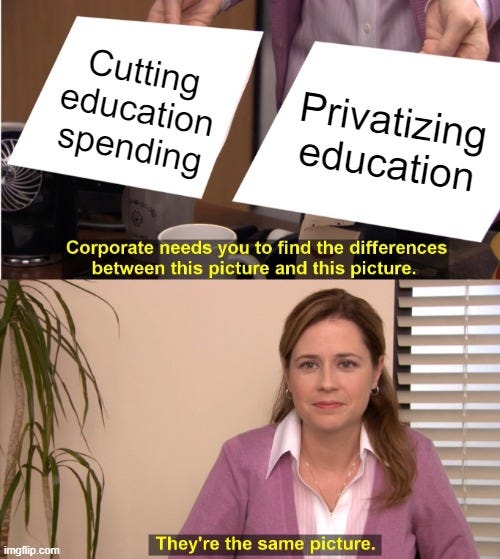Rufo is Reason
Libertarians should love his education reform agenda even if they don't love him
If my The Case Against Education is correct, the best education policy is austerity. Lavish education spending spawned dystopian credential inflation; massive education cuts will reverse the damage. In the book, I defend austerity on standard cost-benefit terms: When the social return on an investment is very low, you should invest vastly less. But in other writings, I’ve also defended austerity on libertarian grounds: The less government spends, the more the private sector expands to replace it. In the limit, zero government spending and full privatization are the same thing.
What precisely should be cut first? The Case Against Education urges readers to be open to almost any kind of cut. Across-the-board cuts. Raising standards, then refusing to fund students below those standards. Cutting especially useless subjects. And on and on.
Still, I’m not naive enough to imagine that government spending on education will vanish anytime soon. What should be done in the meantime? My other big proposed reform in The Case Against Education is to reallocate funding to vocational education due to its higher social return. The general principle: If government is going to spend taxpayer dollars on education, it should spend them well. For example, if you have a choice between funding worthless Zoom school and funding in-person school that at least provides daycare, fund the latter.
To belabor the obvious, almost no one agrees with my vision for education reform. In the U.S., only 5% favor lower spending on education. Globally, clear majorities in every country ever surveyed favor more spending on education. Which is why I was deeply pleased to see that Chris Rufo, author of America’s Cultural Revolution and administrator/provocateur at the New College of Florida, does broadly agree with my austerian vision. Here’s his full agenda on “How to Fix Academia,” posted yesterday on X:
-Reduce the flow of federal funds to universities
-Privatize the student loan market and make colleges partially responsible for student defaults
-Abolish DEI bureaucracies
-Wind down activist pseudo-disciplines
-Reform faculty hiring to restore ideological balance
-Punish universities that discriminate on the basis of race
-Tie federal funding to upholding standards of civil discourse and debate
–Break the accreditation cartel
–Turn a limited number of state universities into classical liberal arts academies
–Set up recruiting pipelines and employment opportunities for classically-minded scholars –Establish new academic journals outside the existing left-wing circles
–Eliminate the requirement to have a master's in education for teaching in K-12 public schools, which will gut the state graduate schools of education
–Require state universities to sign the Kalven Statement and refrain from taking political positions as a corporate entity
–Require all universities that receive federal funds to provide annual summary statistics for race, sex, GPA, and SAT scores
–Enforce standards of civil discourse so that physical violence, intimidation, vandalism, and heckler's vetoes earn immediate suspension or expulsion
–Fund internal watchdogs to hunt for academic fraud
–Require state-affiliated researchers to preregister research hypotheses and make all data available to the public
–Reduce funding for scientific and social-scientific fields that consistently fail to replicate
–Legalize intelligence tests for admissions and hiring
–Provide high-prestige test-out options for individuals to demonstrate domain knowledge without having to earn a bachelor's degree
–Work with employers to screen for capacity, not degrees (an expensive substitute)
–Over time, reduce the overall number of placements at four-year universities—which should cater to the top 10% of the most academically gifted—and shift resources to lower-cost trade programs, community colleges, and professional training that provide a better ROI for society
–Wind down the repressive Title IX bureaucracy
–Significantly reduce the number of administrators and pseudo-therapeutic bureaucracies on campus
–Reward colleges financially for a low admin-to-faculty ratio
–Give tenured faculty raises as the number of admins is reduced
–Allow universities that have been relying on unlimited state loan subsidies (and predatory marketing to high school students) to go bankrupt and then restructure or shut down
–Submit the entire sector to greater market discipline
–Persuade alumni donors to stop giving
This sparked a short followup exchange.
Me: Let's also reduce state and local funding while we're at it.
Chris: Deal.
Me: And libertarians wonder why I like you, Chris!
Chris: Read the thread and let me know if you oppose any of these proposals on libertarian grounds.
This is such a fun request that I’m going to classify all of his proposals into four categories: Full Support, Better Than the Status Quo, Undecided, and Against, with sporadic commentary in bracketed italics.
Full Support
-Reduce the flow of federal funds to universities
-Privatize the student loan market and make colleges partially responsible for student defaults
-Abolish DEI bureaucracies
-Wind down activist pseudo-disciplines
-Tie federal funding to upholding standards of civil discourse and debate
–Eliminate the requirement to have a master's in education for teaching in K-12 public schools, which will gut the state graduate schools of education
–Require state universities to sign the Kalven Statement and refrain from taking political positions as a corporate entity
–Enforce standards of civil discourse so that physical violence, intimidation, vandalism, and heckler's vetoes earn immediate suspension or expulsion
–Reduce funding for scientific and social-scientific fields that consistently fail to replicate
–Legalize intelligence tests for admissions and hiring
–Provide high-prestige test-out options for individuals to demonstrate domain knowledge without having to earn a bachelor's degree [While I fear that test-out options are inherently low-prestige, the cost savings are so massive that it’s worth a try!]
–Over time, reduce the overall number of placements at four-year universities—which should cater to the top 10% of the most academically gifted—and shift resources to lower-cost trade programs, community colleges, and professional training that provide a better ROI for society
–Wind down the repressive Title IX bureaucracy
–Significantly reduce the number of administrators and pseudo-therapeutic bureaucracies on campus
–Allow universities that have been relying on unlimited state loan subsidies (and predatory marketing to high school students) to go bankrupt and then restructure or shut down
–Submit the entire sector to greater market discipline
–Persuade alumni donors to stop giving [Note: Chris said “persuade”!]
Better Than the Status Quo
-Reform faculty hiring to restore ideological balance [While this does have a slight risk of pushing a new official orthodoxy, it would be almost impossible to get anything remotely as bad as the official orthodoxy we already endure. It is no exaggeration to say that most existing humanities and social science professors are not scholars, but priests and priestesses of the Church of Wokism.]
-Punish universities that discriminate on the basis of race [If Chris just said, “End federal funding for universities that discriminate on the basis of race,” I’d support it. Though I think that the best approach would be to deny federal funding to universities that fail to use a transparent meritocratic admission formula.]
Undecided
–Break the accreditation cartel [I’m aware of the problems with the status quo. But “breaking the accreditation cartel” could remove one of the main existing restraints on federal funding. At least right now, you can’t get federal money for your unaccredited College of Homeopathy.]
–Turn a limited number of state universities into classical liberal arts academies [I’d rather have students study Greeks, Romans, and Shakespeare than Grievance Studies, but I just don’t see much student demand or social return.]
–Set up recruiting pipelines and employment opportunities for classically-minded scholars [This is better than recruiting pipelines and employment opportunities for Grievance Studies. But why not just accept that Classics is a noble avocation, instead of making taxpayers fund it? Didn’t Anthony Hopkins’ Titus do more for Shakespeare than the last century of Shakespeare studies?]
–Establish new academic journals outside the existing left-wing circles [Sounds good, but we already have a bunch of explicitly non-left journals. The bottleneck is lack of non-left research, not non-left journals to publish such research.]
–Require all universities that receive federal funds to provide annual summary statistics for race, sex, GPA, and SAT scores [Wouldn’t it be better if universities just stopped collecting race and sex data?]
–Require state-affiliated researchers to preregister research hypotheses and make all data available to the public [Sounds good, but there really is proprietary data. And preregistration is fairly easy to circumvent, so I doubt the extra paperwork is worth it.]
–Work with employers to screen for capacity, not degrees (an expensive substitute) [Sounds good, but don’t employers know their own interests best already?]
–Reward colleges financially for a low admin-to-faculty ratio [Appealing, but I’m worried this will just lead schools to have admins teach one class a year.]
Against
–Fund internal watchdogs to hunt for academic fraud [In anything like the current academic environment, this will mostly amount to politically-motivated witch hunts against non-left dissidents.]
–Give tenured faculty raises as the number of admins is reduced [Tenured faculty are already grossly overpaid! You might imagine this will get faculty on the side of reform, but that’s highly unlikely. Objective self-interest has almost no effect on people’s political views.]
I know Chris Rufo rubs many libertarians the wrong way. Like almost every human, he has spoken rashly on occasion. But on balance, his vision for education reform is radically libertarian and eminently sensible. Sure, you could dwell on minor issues of disagreement. Sure, you could focus on tone policing. But is it not better and wiser to give Rufo full credit for all of the numerous excellent things he says?




I like many of Rufo's ideas, and he seems to be an amazingly gifted political tactician.
He rubs libertarians the wrong way because he goes out of his way to insult them. Perhaps there's a tactical reason for this too, but I'm taken aback every time I see him do it, and it's been several times now. He's harsher in rhetoric on libertarians than on leftists.
I don't have anything against him, although I don't agree with him on everything. Not sure what he's got against me.
“The general principle: If government is going to spend taxpayer dollars on education, it should spend them well.”
Google translate into cynicalese: The general principle: If government is going to spend taxpayer dollars on education, it should ruin the most valuable stuff.